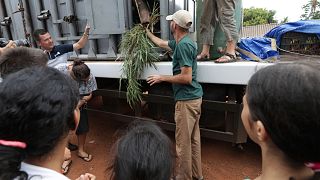Lebanon
International relief teams from more than 20 countries are working to help clean up and investigate in the wake of last week's devastating explposion in Beirut's port.
The explosion was preceded by a large fire at a port warehouse and a smaller but still substantial initial explosion. The blast killed more than 220 people, injured 7,000 others and caused between US$10–15 billion of damage. An estimated 300,000 people were also made homeless.
Lebanon's Prime Minister, Hassan Diab, has said that the explosion was caused by the detonation of 2,750 tonnes of ammonium nitrate that he said had been stored unsafely at a warehouse in the port.
Many have concluded that it is the same consignment of the chemical compound that was confiscated by the Lebanese government from the cargo ship MV Rhosus six years ago.
Newly-released documents suggest several government agencies in Lebanon were informed about the compound, including the Ministry of Justice.
It leaves behind a complicated legal and logisitical tanle that may take years to be completely resolved.
In total, nearly 800 rescuers and medical personnel from some 20 countries are currently lending a hand to the Lebanese search teams.
Stefania Fiore, head of the Italian rescue team of chemistry, biology, radiology and nuclear specialists admits it's a complicated issue:
"The largest dispersion of toxic gas over the area is almost complete.
However, there are still some 'hot spots' in the port area where specific chemicals were stored.
Our job, in support of the Lebanese and international search teams on the ground, is to ensure that they operate in a safe environment or to recommend the best protective equipment".
Around the port, the Lebanese navy is continuing the search, but with little hope of finding survivors after so long.
In addition to the ongoing grief, there is distress and urgent need for the survivors: the Lebanese capital is devastated and the port is currently unuseable. It was through here that 85% of food imports entered the country.
Now, according to the World Food Programme, Lebanon is on the verge of a food crisis. The WFP has confirmed the shipment of 50,000 tons of wheat to Beirut.
And while short term relief can be provoided, rebuilding of the port of Beirut will be a much longer term project.











02:09
In a bid to aid its economy, Lebanon hopes to return to golden age of tourism
Go to video
El-Sissi and Aoun urge Israel to end strikes on Lebanon
00:00
Pics of the day: April 18, 2025
02:04
Egypt urges complete Israeli exit from southern Lebanon
01:00
Pics of the day: January 28, 2025
00:59
Lebanon: newly-elected president receives visit from French president Macron